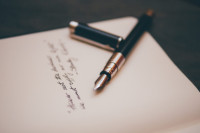
Hold That Train! Writing a Sliding-Doors Thriller
crimereads.com – Thursday February 15, 2024

I first saw Sliding Doors on VHS in 1999, the year after it released in theaters. I was eighteen and seeking my way back from my first real heartbreak. Mere days after an amicable split with my boyfriend, a slow drifting apart that was more bittersweet than painfully acute, he had called me up to say he was seeing someone new—my best friend. Then the pain rushed in. I slid the tape into my VCR expecting the kind of romantic comedy that would feel bad and good at the same time, like pressing on a bruise. (As it turned out, Sliding Doors was not a typical rom-com, something I’ll return to in a moment.) But it did resonate in unexpected ways.
In the opening sequence of the dual-timeline film, Gwyneth Paltrow’s character Helen gets fired from her job, and in one reality, catches the train and comes home to find her boyfriend in bed with another woman. Helen’s experience didn’t precisely mirror my own, but heartbreak has a way of shimmying from a TV screen or leeching from the pages of a novel, finding its way into your soft spots. (In the other reality, Helen misses the train and her boyfriend’s mistress has left by the time she makes it home, a sequence of events that only seems to launch her down a brighter path.)

Why a Writing Ritual Is the Ultimate Creativity Boost—How to Design One for Yourself
camillestyles.com – Monday February 5, 2024

I've long believed: a happy, healthy life is built on rituals. From your morning routine to your evening wind-down, our days flow with greater ease when we have supportive habits in place. Decision fatigue is an inevitable truth of our lives (the internet presents us with no shortage of rabbit holes). But rituals allow us to weave more intention into our choices. By committing to what helps us feel our best, we benefit from a level of self-trust that becomes a fixture of our days. And as a writer, that truth shows itself most in my daily writing rituals.
I’m both blessed and cursed with a creative career. Writing, of course, is a skill you develop through education, experience, and exposure to beautiful words and effective style. But it also requires inspiration—a central point from which we can build a story, argument, or even a single thought. And honestly? Some days, I don’t have it. Writing rituals, however, help me conquer the blank page with confidence.

You're Asking Too Much From Your Story And Not Enough From Yourself
nofilmschool.com – Tuesday January 30, 2024

The only way to get vulnerability and truth into your story is to share parts of yourself.
Last year, I was staring at a blinking cursor on my screen and at a crossroads. I had written a screenplay with a great plot, but the feedback I kept getting was that it didn't have a soul.
I distinctly remember a friend asking me, "What makes this a Jason Hellerman script?"
At the time, I answered, "Because my name is on it."
It was a clever retort, but I was wrong.
Sure, it was on the title page, but the issue I was having was that I was not putting enough of myself into the writing. I thought the plot and the characters would compensate for it. But because I was not imbuing the page with a piece of me, it still felt hollow.
That can only get you so far.
And it wasn't going to get my movie made.

6 magazines accepting international submissions for fiction, poetry, and everything in between
thedailystar.net – Tuesday January 30, 2024

To help save you the effort and to hopefully nudge you a little to submit your work, here are a few magazines around the world accepting international submissions for this year.
One of the few vital ways for a writer to build on their skills is to practise, and one way to grow your portfolio as well as your readership is to submit your work to magazines around the world to make sure your writing is reaching new audiences across the globe.
It can be scary to put yourself out there, to think that someone might be reading something you poured your heart and soul into and not like it. But this year, I urge writers to work on your pieces, be brave and share your work with magazines who can help deliver that work to readers.
And so, to help save you the effort and to hopefully nudge you a little to submit your work, here are a few magazines around the world accepting international submissions for this year:

After “Romantasy,” What Are the Next Buzzy Bookish Portmanteaus?
bookriot.com – Monday January 29, 2024

Even if we don’t realize it, buzzwords permeate our professional lives. Who hasn’t heard of phrases like “return on investment” or “customer journey”? They sound very corporate, yes, but they make long-winded ideas easy to recall and make complex information easier to digest.
It’s no wonder, then, that buzzwords are well-loved in the literary realm. There have been many buzzwords in the publishing world over the years, such as “high concept,” which usually refers to the quality of a plot, or “comps,” which are the comparative titles a manuscript has when authors pitch to literary agents.
Perhaps the biggest buzzword in 2023 and possibly this year is “romantasy,” or the fusion of the romance and fantasy genres. This is evident in the continued rise of romantasy novels on TikTok and on bestseller lists, such as Fourth Wing by Rebecca Yarros and A Court of Thorns and Roses by Sarah J Maas.

The Harried Mystery Hero(ine) Or, How to Write a Mystery (Easy)
By G. Miki Hayden
Instructor at Writer's Digest University online and private writing coach
firstwriter.com – Monday January 29, 2024

Nothing is so essential to the successful creation of the mystery—from the grittiest work of fiction to the most comedic—as presenting the protagonist’s unrelenting pursuit of the McGuffin* against all possible odds and impossible barriers.
The secret to generating the story’s drama—and, again, even a funny mystery needs plenty of drama—is to never allow your main character a moment’s rest. Even when the hero is relaxing by the pool drinking an expensive wine accompanied by caviar on toast points, he must at the very least, be worrying himself to a veritable frazzle. If he sleeps, he sleeps badly—maybe a sleep interrupted by the ringing of the phone and appalling news (another murder? the suspect has escaped?). If he meets a woman he could love, she’s either a plant working to undermine his investigation, in grave danger herself, or sometimes even the killer (yup).
Though I seem to be making light of your protagonist’s troubles, this is the way the story has to proceed, no matter the subgenre or the tone. Your job is to attach us to the character and then do your best to drive him or her over the edge, literally or figuratively, or both. That, then, is drama.

The sure-fire way to getting your book published, according to one of UK’s top literary agents
bigissue.com – Sunday January 28, 2024

The saying goes ‘everyone has a book in them’, and these days it really is possible to get published as there are multiple routes to seeing your book in the shops.
The traditional way to get your book published is via a literary agent like myself, who’ll endeavour to find you a publisher. Then there’s the self-publishing route, which is becoming increasingly popular and gives you ultimate control of your publishing journey. If you self-publish on Amazon, eBook sales can also be far greater than sales of a physical book and financially very lucrative.
Reading is such a subjective business and the digital marketplace means that the traditional gatekeepers are no longer blocking the way to publication. There’s a wealth of information online and in publications such as The Writers’ and Artists’ Yearbook, an excellent source of literary agents you can approach and what genres they represent, updated each year.
If you’re reading this, you may be in the process of writing a book or you have written a book and are trying to get published. Agents prefer writers to have completed a manuscript before they consider representation, but initially we’re only assessing the first three chapters and a pitch, so these need to give us a good sense of your story. If you’ve written a first draft and have read it out loud without wanting to skim any passages(!) then this is the time to start sending it out to agents, but research them carefully.
The key to finding a good match is by submitting to agents who represent authors writing in a similar space to you, or who are actively building their lists and are on the lookout for new talent. Are you able to list two or three established authors writing in a similar space? Successful writers tend to be avid readers with a greater sense of who they are writing for. Some have drawers full of unpublished short stories and manuscripts that never found a publisher, but no word is wasted… they were honing their craft.

How To Become A Published Writer
forbes.com – Sunday January 21, 2024

Becoming a published writer is difficult, but it’s definitely possible. From newspapers to magazines, there are plenty of places to pitch. And pitching is super competitive. Some journalists have decades of experience and are more likely to have pitches accepted than writers who haven’t been published.
Before you decide to email an editor, make sure you do your research to craft solid pitches. For people who’ve never pitched it can be severely disappointing. Out of my first one hundred pitches I got one response— and it was a yes. If I had given up after my initial ninety nine rejections I wouldn’t be writing for this publication today.
So, before you throw in the towel, think about all of the possibility. The possibility of getting published. The possibility of writing such powerful words that you move the masses. The possibility of writing for prominent publications for the rest of your life. If I can give any advice on pitching it’s this— don’t stop pitching. Are you interested in becoming a published writer? Here are a few tips.

Literary speed dating: swipe left or right?
artshub.com.au – Friday January 19, 2024

It’s the start of the year, so maybe one of your resolutions is to make more meaningful connections – not so much in a romantic fashion, but in a career sense. Do you have a manuscript set aside, little time and no idea how to proffer it to the right hands, so that it may eventually become published? Literary speed dating may be the answer. But, beware, it requires preparation and may not be the right avenue for those too shy and nervous to pitch in person.
Like the regular dating format, the literary version follows a similar principle of setting up participants with a limited time to engage with one another – tête-à-tête or online. With this quick-talking, power chat formula, you can try and gain interest in your book with a number of industry professionals. Perhaps a better name for it would be literary speed pitching.

How to Write a Query Letter
electricliterature.com – Wednesday January 17, 2024

A practical guide to getting literary agents interested in your book
When submitting to an agent or editor, you will need a query letter. The purpose of a query letter is to briefly introduce yourself and your work to the editor or agent, with the hope they’ll be intrigued enough to want to read more.
Here is a rather typical method I’ve used. Most query letters contain three or four paragraphs, and you’ll want to keep it to no more than a page, single spaced. [Please note: I’ve inserted additional comments in brackets.]
First Paragraph
There are one of two ways to approach the first paragraph. You can keep it simple by stating the name of your work, the genre, and why you are querying this particular agent or editor. For example, here is what I used for How to Survive Death and Other Inconveniences.
Get the free newsletter | Submit a news item or article | Get Writers' News for your website





